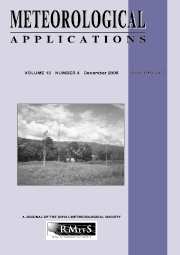Crossref Citations
This article has been cited by the following publications. This list is generated based on data provided by
Crossref.
Lhotellier, Rémi
2006.
Spatialisation de la température minimale de l’air à l’échelle quotidienne sur 4 départements alpins français.
Climatologie,
Vol. 3,
Issue. ,
p.
55.
Matyas, Corene J.
2010.
Use of Ground‐based Radar for Climate‐Scale Studies of Weather and Rainfall.
Geography Compass,
Vol. 4,
Issue. 9,
p.
1218.
Philippe, Félix
Sturman, Andrew
and
Quenol, Hervé
2013.
Variabilité spatiale des températures dans le contexte du changement climatique a l’échelle du vignoble de Marlborough (Nouvelle-Zélande).
Climatologie,
Vol. 10,
Issue. ,
p.
123.
Bonnefoy, C.
Quenol, H.
Bonnardot, V.
Barbeau, G.
Madelin, M.
Planchon, O.
and
Neethling, E.
2013.
Temporal and spatial analyses of temperature in a French wine‐producing area: the Loire Valley.
International Journal of Climatology,
Vol. 33,
Issue. 8,
p.
1849.
Hadji, Riheb
Boumazbeur, Abd errahmane
Limani, Yacine
Baghem, Mustapha
Chouabi, Abd el Madjid
and
Demdoum, Abdeslem
2013.
Geologic, topographic and climatic controls in landslide hazard assessment using GIS modeling: A case study of Souk Ahras region, NE Algeria.
Quaternary International,
Vol. 302,
Issue. ,
p.
224.
Hoegh, Andrew
and
Leman, Scotland
2015.
A spatio-temporal model for assessing winter damage risk to east coast vineyards.
Journal of Applied Statistics,
Vol. 42,
Issue. 4,
p.
834.
Mosedale, Jonathan R.
Wilson, Robert J.
Maclean, Ilya M. D.
and
Añel, Juan A.
2015.
Climate Change and Crop Exposure to Adverse Weather: Changes to Frost Risk and Grapevine Flowering Conditions.
PLOS ONE,
Vol. 10,
Issue. 10,
p.
e0141218.
Mosedale, Jonathan R.
Abernethy, Kirsten E.
Smart, Richard E.
Wilson, Robert J.
and
Maclean, Ilya M. D.
2016.
Climate change impacts and adaptive strategies: lessons from the grapevine.
Global Change Biology,
Vol. 22,
Issue. 11,
p.
3814.
Kim, Jin-Ah
and
Byun, Hi-Ryong
2016.
Spatiotemporal variability of the latest frosts in Korean Peninsula and causes of atmospheric circulation.
Meteorology and Atmospheric Physics,
Vol. 128,
Issue. 5,
p.
663.
Hadji, Riheb
Rais, Khaled
Gadri, Larbi
Chouabi, Abdelmadjid
and
Hamed, Younes
2017.
Slope Failure Characteristics and Slope Movement Susceptibility Assessment Using GIS in a Medium Scale: A Case Study from Ouled Driss and Machroha Municipalities, Northeast Algeria.
Arabian Journal for Science and Engineering,
Vol. 42,
Issue. 1,
p.
281.
Neethling, Etienne
Petitjean, Théo
Quénol, Hervé
and
Barbeau, Gérard
2017.
Assessing local climate vulnerability and winegrowers’ adaptive processes in the context of climate change.
Mitigation and Adaptation Strategies for Global Change,
Vol. 22,
Issue. 5,
p.
777.
Le Roux, Renan
de Rességuier, Laure
Corpetti, Thomas
Jégou, Nicolas
Madelin, Malika
van Leeuwen, Cornelis
and
Quénol, Hervé
2017.
Comparison of two fine scale spatial models for mapping temperatures inside winegrowing areas.
Agricultural and Forest Meteorology,
Vol. 247,
Issue. ,
p.
159.
Webb, M.
Pirie, A.
Kidd, D.
and
Minasny, B.
2018.
Spatial analysis of frost risk to determine viticulture suitability in Tasmania, Australia.
Australian Journal of Grape and Wine Research,
Vol. 24,
Issue. 2,
p.
219.
Jemmett‐Smith, Bradley C.
Ross, Andrew N.
Sheridan, Peter F.
Hughes, John K.
and
Vosper, Simon B.
2019.
A case‐study of cold‐air pool evolution in hilly terrain using field measurements from COLPEX.
Quarterly Journal of the Royal Meteorological Society,
Vol. 145,
Issue. 720,
p.
1290.
de Rességuier, Laure
Mary, Séverine
Le Roux, Renan
Petitjean, Théo
Quénol, Hervé
and
van Leeuwen, Cornelis
2020.
Temperature Variability at Local Scale in the Bordeaux Area. Relations With Environmental Factors and Impact on Vine Phenology.
Frontiers in Plant Science,
Vol. 11,
Issue. ,
Molitor, Daniel
Fraga, Helder
and
Junk, Jürgen
2020.
UniPhen – a unified high resolution model approach to simulate the phenological development of a broad range of grape cultivars as well as a potential new bioclimatic indicator.
Agricultural and Forest Meteorology,
Vol. 291,
Issue. ,
p.
108024.
Schultze, Steven R.
and
Sabbatini, Paolo
2022.
Impact of Early Season Temperatures in a Climate-Changed Atmosphere for Michigan: A Cool-Climate Viticultural Region.
Atmosphere,
Vol. 13,
Issue. 2,
p.
251.
2023.
Development and Territorial Restructuring in an Era of Global Change.
p.
181.
Tadić, Vjekoslav
Gligorević, Kosta
Mileusnić, Zoran
Miodragović, Rajko
Hajmiler, Marko
and
Radočaj, Dorijan
2023.
Agricultural Engineering Technologies in the Control of Frost Damage in Permanent Plantations.
AgriEngineering,
Vol. 5,
Issue. 4,
p.
2079.
Terpou, Antonia
Arvaniti, Olga S.
Afratis, Nikolaos
Athanasiou, Gina
Binard, Frank
and
Zahariadis, Theodore
2024.
Sustainable solutions for mitigating spring frost effects on grape and wine quality: facilitating digital transactions in the viniculture sector.
Sustainable Food Technology,




